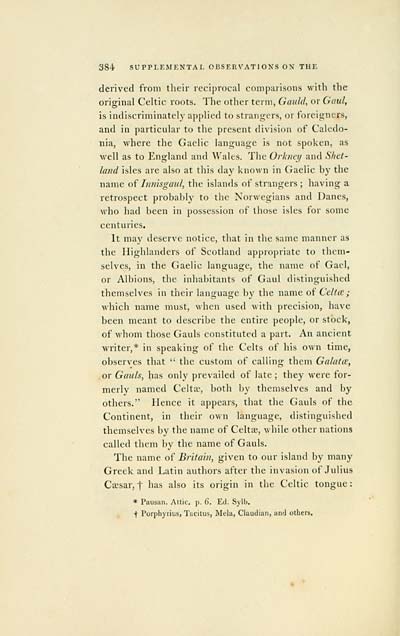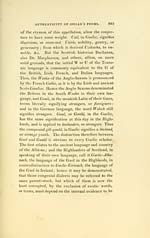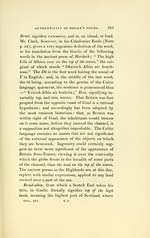J. F. Campbell Collection > Poems of Ossian > Volume 3
(396)
Download files
Complete book:
Individual page:
Thumbnail gallery: Grid view | List view

384 SUPPLEMENTAI- OBSERVATIONS ON THE
derived from tlieir reciprocal comparisoiis MÌth tlie
original Celtic roots. The other term, Gatild, or Gmil,
is indiscriminately applied to strangers, or foreigners,
and in particular to the present division of Caledo-
nia, where the Gaelic langiiage is not spoken, as
well as to Enghind and Wales. The Orkiiei/ and Shet-
land isles are also at this day known in Gaelic by the
name oi Iiniisgaii/, tlie islands of strangers ; having a
retrospect probal)ly to the Norwegians and Danes,
who had been in possession of those isles for some
centuries.
It may deserve notice, that in the same manner as
the Highlanders of Scotland appropriate to thcni-
selves, in the Gaelic language, the name of Gael,
or Albions, the inhabitants of Gaul distinguished
themselves in their languagc by the name of Celtte ;
Avhich name must, when used with precision, have
been meant to describe the entire people, or stòck,
of whom those Gauls constituted a part. An ancicnt
writer,* in speaking of the Celts of his own time,
observes that " the custom of calling them Galatce,
or Gauls, has only pi-evailed of late ; they were for-
merly named Celta', both by themselves and by
others." Hence it appears, that the Gauls of the
Continent, in their own language, distinguished
themselves by the name of Celtte, m hile othcr nations
called them by the name of Gauls.
The name of Britain, given to our island by many
Greek and Latin authors after the invasion of Julius
Cffisar, t has also its origin in the Celtic tongue :
* Pausan. Attic. p. G. Ed. Sylb.
t Porpli) riiis, Tiicitus, Mela, Claudian, and others.
derived from tlieir reciprocal comparisoiis MÌth tlie
original Celtic roots. The other term, Gatild, or Gmil,
is indiscriminately applied to strangers, or foreigners,
and in particular to the present division of Caledo-
nia, where the Gaelic langiiage is not spoken, as
well as to Enghind and Wales. The Orkiiei/ and Shet-
land isles are also at this day known in Gaelic by the
name oi Iiniisgaii/, tlie islands of strangers ; having a
retrospect probal)ly to the Norwegians and Danes,
who had been in possession of those isles for some
centuries.
It may deserve notice, that in the same manner as
the Highlanders of Scotland appropriate to thcni-
selves, in the Gaelic language, the name of Gael,
or Albions, the inhabitants of Gaul distinguished
themselves in their languagc by the name of Celtte ;
Avhich name must, when used with precision, have
been meant to describe the entire people, or stòck,
of whom those Gauls constituted a part. An ancicnt
writer,* in speaking of the Celts of his own time,
observes that " the custom of calling them Galatce,
or Gauls, has only pi-evailed of late ; they were for-
merly named Celta', both by themselves and by
others." Hence it appears, that the Gauls of the
Continent, in their own language, distinguished
themselves by the name of Celtte, m hile othcr nations
called them by the name of Gauls.
The name of Britain, given to our island by many
Greek and Latin authors after the invasion of Julius
Cffisar, t has also its origin in the Celtic tongue :
* Pausan. Attic. p. G. Ed. Sylb.
t Porpli) riiis, Tiicitus, Mela, Claudian, and others.
Set display mode to: Large image | Transcription
Images and transcriptions on this page, including medium image downloads, may be used under the Creative Commons Attribution 4.0 International Licence unless otherwise stated. ![]()
| Early Gaelic Book Collections > J. F. Campbell Collection > Poems of Ossian > Volume 3 > (396) |
|---|
| Permanent URL | https://digital.nls.uk/81286504 |
|---|
| Description | Vol. III. |
|---|---|
| Shelfmark | Cam.1.b.5 |
| Additional NLS resources: | |
| Attribution and copyright: |
|
| Description | Volumes from a collection of 610 books rich in Highland folklore, Ossianic literature and other Celtic subjects. Many of the books annotated by John Francis Campbell of Islay, who assembled the collection. |
|---|
| Description | Selected items from five 'Special and Named Printed Collections'. Includes books in Gaelic and other Celtic languages, works about the Gaels, their languages, literature, culture and history. |
|---|

